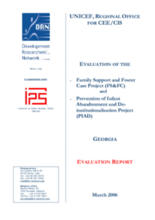This UNICEF evaluation seeks to identify what specific contributions the “Prevention of Infant Abandonment and De-institutionalisation” (PIAD) and “Family Support and Foster Care” (FS&FC) projects are making towards the development of a full-fledged gatekeeping system in Georgia. In particular, the evaluation discusses: 1) whether the two projects have succeeded in establishing good practices in gatekeeping, which can have a demonstration effect and be scaled-up; and 2) whether they managed to influence government policies towards adopting a family and community-based approach to child protection. Several qualitative and quantitative methods were used to collect data from key stakeholders.
In general this study finds that the Family Support and Foster Care (FS&FC) project and the Prevention of Infant Abandonment and De-institutionalisation (PIAD) project have introduced elements of practice that constitute the basis for the development of a full-fledged gatekeeping system in Georgia, including the first cadre of social workers in the country, sound case management practices, and standards for child care services (that are becoming the basis for national ones). The multidisciplinary decision-making panels created at regional level constitute one of the promising practices pioneered by the FS&FC project, establishing a mechanism for transparent decisionmaking in the best interest of the child. The PIAD has introduced innovative practices to handle the complexity of needs of beneficiaries, including shelter and employment support. Furthermore, the MoES has now taken over FS&FC services. For PIAD, the more articulated and expensive approach makes government take-over more uncertain. However, together the projects have been successful in promoting the adoption of a government strategy for reforming child protection services, resulting in the establishment of the Interministerial commission on Child Welfare and De-institutionalisation, substantial work on standards for alternative child care services, and the creation of the government’s Optimisation Plan on institutions.
In order to build on the results of the two projects and work towards a full-fledged gatekeeping system in Georgia, a number of challenges will have to be addressed. The definition of institutional mandates and accountabilities for the provision of various types of services is still in progress, and there is no clear indication of which services the government would deliver and which ones would need to be outsourced. In the meantime, priority needs remain unmet, such as day care centres, or services for disabled children. The hasty closure of institutions before such alternative services are in place may have a negative impact on child welfare. Weak inter-agency cooperation, and, particularly, the insufficient MLH&SA involvement, are preventing the development of an effective referral system. In addition, existing mechanisms for public funding to institutions, and the lack of employment alternatives for staff, still provide incentives to institutionalisation. The cultural resistance of institutions’ staff constitutes a major obstacle for gatekeeping.
Pertaining specifically to the services provided by the projects, the lack of adequate follow-up procedures to assess service outcomes, and the lack of a coherent monitoring system are additional challenges that must be addressed.
Lessons learned from this analysis include:
- Cash benefits are not always the right or sufficient instrument to support parents in raising their children. An integrated package of services, including shelter and employment support, is more effective in addressing the complexity of beneficiaries’ needs.
- Targeted employment policies are an important component of a gatekeeping system.
- Sound cooperation towards a common objective and the effective division of roles established between UNICEF, implementing agencies, and other donors in the country have been a powerful tool in leveraging government support and moving the system in the direction of child welfare reform.
- In order to create an effective gatekeeping system, a number of institutional changes should happen at the same time. Limited changes in one sector only (such as closure of institutions while delaying the establishment of alternative services, or social work without a proper referral system) are not likely to produce a significant impact on child and family welfare.
©UNICEF

